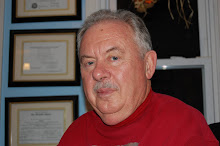Terry Mattingly is one of my favorite Christian columnists. Seldom do I read what I would call a boring or irrelevant column. This guy has a handle on what is going on in Christianity. So I am posting his latest column and would encourage those who read it to get on his mailing list. It's free.
This column was syndicated by Scripps Howard News Service on 05/23/2007
For generations, preachers have been asking the same sobering question to
provoke people to think about ultimate issues: If you died tonight, do you
know where you would spend eternity?
The Rev. Rick Kingham has started asking men a different question, knowing
that too many of them are living lives defined by solo commutes, office
cubicles, fast food, Internet niches, television remotes, eight-foot
fences, garage-door openers and gated communities. Here is the question:
Do you have any idea who will carry your casket out of the church after
your funeral?
Many men struggle to answer.
"It's a sad day when most men can't name six men that they know are their
close friends," said Kingham, president of the National Coalition of Men's
Ministries, a nondenominational network of 110 regional and national
groups. "There are men who -- if they really get honest -- will tell you
that they only have one or two real friends."
That's a huge gap in millions of lives.
A decade ago, waves of men gathered in Washington, D.C., to kneel and
repent of their sins, from spiritual apathy to workaholism, from absentee
fatherhood to emotional aloofness in their marriages. The event was called
"Stand in the Gap" and, with the Promise Keepers movement leading the way,
it drew a million or more men to the National Mall -- one of the largest
gatherings of any kind in the nation's history.
The goal of the 1997 rally, said Kingham, was to dare men to stand up at
church, home and work and say, "I'm a man. I'm a Christian. I'm not
ashamed of that." The event's original slogan was, "Where are the men?"
That remains a valid question, which is why some of leaders of the first
"Stand in the Gap" event have decided to mark its 10-year anniversary with
another rally. They hope to draw about 250,000 men to the Oct. 6 event,
which will be held at the Washington Monument and on the Ellipse, just
south of the White House. The Promise Keepers network, which is much
smaller than at its peak in the late 1990s, is one member of the larger
coalition behind "Stand in the Gap 2007."
Truth is, religious groups that want to reach men face many of the same
cultural challenges as they did a decade ago and some of the problems have
even gotten worse. In the case of online pornography, 1997 was the "good
old days," said Kingham.
"If anything," he said, "there are powerful forces at work in our society
that have driven men even further into isolation than they were 10 years
ago and even further from the kinds of community that they need in their
lives."
While the 2007 event will be smaller in size, its leaders hope to reach
out to a wider audience in terms of the ages of the men who take part.
For better or for worse, the original rally turned into a kind of
born-again Woodstock for men in the 77-million-member Baby Boom
generation. Organizers hope that the program at Stand in the Gap 2007 will
also include speakers and themes for the World War II generation that many
call the "Builders," as well as the post-Boomer generation known as the
"Busters" and the "Millennials," born after 1982.
"If we can find a way to let these four groups of men talk to each other
about what is going on in their lives and their faith, then we will have
accomplished our main goal," said Steve Chavis, who served as media
coordinator for the 1997 rally and is playing the same role again.
The first rally focused most of its energy on family issues and racial
reconciliation and these subjects will surface again. Kingham said Stand
in the Gap 2007 will also emphasize themes of loneliness, complacency and
disillusionment. But after looking inward, men must find ways to reach
beyond their own needs and help others.
Take, for example, all of those Baby Boomers who will soon face
retirement.
"We have to tell these men, 'Don't quit your jobs. ... Use your jobs and
skills in missions, relief and development projects around the world. You
can help the widows and children,' " said Kingham. "There are all kinds of
ways that men can offer a credible witness to what Jesus Christ is doing in
their lives."
NEXT WEEK: Fathers, sons and empty pews.
Terry Mattingly (www.tmatt.net) directs the Washington Journalism Center
at the Council for Christian Colleges and Universities. He writes this
weekly column for the Scripps Howard News Service.
Visit the Internet Monk Archives
5 years ago

No comments:
Post a Comment